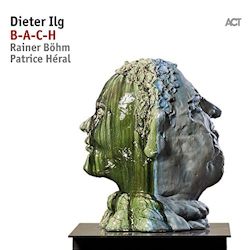 BUY NOW AmazonUK AmazonUS |
|
931
Goldberg B
Siciliano
Air
Goldberg C
Präludium XII
Sarabande
Präludium VII
Goldberg A
1052
Goldberg H
924
Rainer Böhm (piano): Dieter Ilg (bass): Patrice Héral (drums)
Recorded January 2017, Bauer Studios, Ludwigsburg
Joshua Redman once said, apparently - it’s quoted in the notes to this release - ‘You can’t play jazz without also playing Bach’, which would perhaps have come as a surprise to Papa Mutt Carey. And I dread to think what Eddie Condon would have said on the matter, though I doubt it would have been much to do with contrapuntalism. But there has been a long engagement between jazz musicians and the music of Bach and time was when the only two classical composers cited by them were Bach and Stravinsky. Bassist Dieter Ilg and his trio now enter the lists with this 12-track sequence of ‘Variations on Bach’.
Ilg has form here. He’s previously visited Verdi’s Otello, Wagner’s Parsifal and Beethoven in his classical excavations, so unless he’s planning to go back to Sweelinck or Josquin I think it’s safe to say he’s a Bach-to-the Nineteenth-Century guy. His technique is impeccable, his tone warm and his conception essentially romanticised-to-reverential. This is no Bachian carve-up. Pianist Rainer Böhm naturally bears considerable burdens, not least when the trio visit the Goldberg Variations and his touch is lustrous and refined and expressive, as heard in 931. The trio finds songfulness in Goldberg B and an element of allusion in the Siciliano before the piano picks out the theme.
They dare to visit the ‘Air on the G string’ for a rather old fashioned and richly coated reading whereas Goldberg C witnesses a rather more athletic interplay between the three musicians, Böhm’s piano unusually tart and Patrice Héral’s drum work virtuosic and busy. For the Sarabande, Ilg takes the opening statements over Böhm’s prompts and supportive percussive wash before the piano takes over the lead role. Things are at their most lyric when Ilg takes a singing bass solo on Präludium VII – well placed pizzicati here - though there is a strangely Louissier-like start to 1052 (these numerical references are to the BWV numbers) that proves rather disconcerting before a funkier bass line breaks out. The disc ends with the Goldberg Variations’ Aria da capo, which is different to the opening theme which is also played, though not desperately different.
This is accomplished playing but I’m not sure it says much about Bach or indeed about this trio. Romantic affinities lead to an element of stylistic straight-jacketing and the soloing doesn’t stray much beyond the bounds of limited improvisation.
Jonathan Woolf